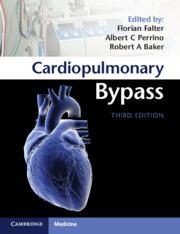Book contents
- Cardiopulmonary Bypass
- Cardiopulmonary Bypass
- Copyright page
- Contents
- Contributors
- Foreword
- Chapter 1 Human Factors and Teamwork in Cardiac Surgery
- Chapter 2 Equipment for Cardiopulmonary Bypass
- Chapter 3 Monitoring during Cardiopulmonary Bypass
- Chapter 4 Cardiopulmonary Bypass Circuit Setup and Safety Checks
- Chapter 5 Priming Solutions for Cardiopulmonary Bypass Circuits
- Chapter 6 Anticoagulation for Cardiopulmonary Bypass
- Chapter 7 Conduct of Cardiopulmonary Bypass
- Chapter 8 Minimal Invasive Extracorporeal Circulation
- Chapter 9 Considerations for Operations Involving Deep Hypothermic Circulatory Arrest
- Chapter 10 Metabolic Management during Cardiopulmonary Bypass
- Chapter 11 Myocardial Preservation during Cardiopulmonary Bypass
- Chapter 12 Weaning from Cardiopulmonary Bypass
- Chapter 13 Intraoperative Mechanical Circulatory Support and Other Uses of Cardiopulmonary Bypass
- Chapter 14 Mechanical Circulatory Support
- Chapter 15 Cardiopulmonary Bypass for Pediatric Cardiac Surgery
- Chapter 16 Coagulopathy and Hematological Disorders Associated with Cardiopulmonary Bypass
- Chapter 17 Inflammation and Organ Damage during Cardiopulmonary Bypass
- Chapter 18 Neuromonitoring and Cerebral Morbidity Associated with Cardiopulmonary Bypass
- Chapter 19 Renal Morbidity Associated with Cardiopulmonary Bypass
- Chapter 20 Common and Uncommon Disasters during Cardiopulmonary Bypass
- Index
- References
Chapter 6 - Anticoagulation for Cardiopulmonary Bypass
Published online by Cambridge University Press: 24 October 2022
- Cardiopulmonary Bypass
- Cardiopulmonary Bypass
- Copyright page
- Contents
- Contributors
- Foreword
- Chapter 1 Human Factors and Teamwork in Cardiac Surgery
- Chapter 2 Equipment for Cardiopulmonary Bypass
- Chapter 3 Monitoring during Cardiopulmonary Bypass
- Chapter 4 Cardiopulmonary Bypass Circuit Setup and Safety Checks
- Chapter 5 Priming Solutions for Cardiopulmonary Bypass Circuits
- Chapter 6 Anticoagulation for Cardiopulmonary Bypass
- Chapter 7 Conduct of Cardiopulmonary Bypass
- Chapter 8 Minimal Invasive Extracorporeal Circulation
- Chapter 9 Considerations for Operations Involving Deep Hypothermic Circulatory Arrest
- Chapter 10 Metabolic Management during Cardiopulmonary Bypass
- Chapter 11 Myocardial Preservation during Cardiopulmonary Bypass
- Chapter 12 Weaning from Cardiopulmonary Bypass
- Chapter 13 Intraoperative Mechanical Circulatory Support and Other Uses of Cardiopulmonary Bypass
- Chapter 14 Mechanical Circulatory Support
- Chapter 15 Cardiopulmonary Bypass for Pediatric Cardiac Surgery
- Chapter 16 Coagulopathy and Hematological Disorders Associated with Cardiopulmonary Bypass
- Chapter 17 Inflammation and Organ Damage during Cardiopulmonary Bypass
- Chapter 18 Neuromonitoring and Cerebral Morbidity Associated with Cardiopulmonary Bypass
- Chapter 19 Renal Morbidity Associated with Cardiopulmonary Bypass
- Chapter 20 Common and Uncommon Disasters during Cardiopulmonary Bypass
- Index
- References
Summary
Anticoagulation is mandatory for any form of extra-corporeal circulation to prevent activation of the coagulation system through contact between blood and artificial surfaces and through blood stasis. The absence of sufficient anticoagulation is likely to result in clot formation within minutes of aortic cannulation and commencement of CPB, with detrimental consequences for the patient. This chapter briefly outlines the history of heparin before discussing its pharmacology, intraoperative hemostasis monitoring, the management of heparin resistance and Heparin Induced Thrombocytopenia (HIT) and the outlook for anticoagulation on CPB.
Keywords
- Type
- Chapter
- Information
- Cardiopulmonary Bypass , pp. 49 - 56Publisher: Cambridge University PressPrint publication year: 2022

